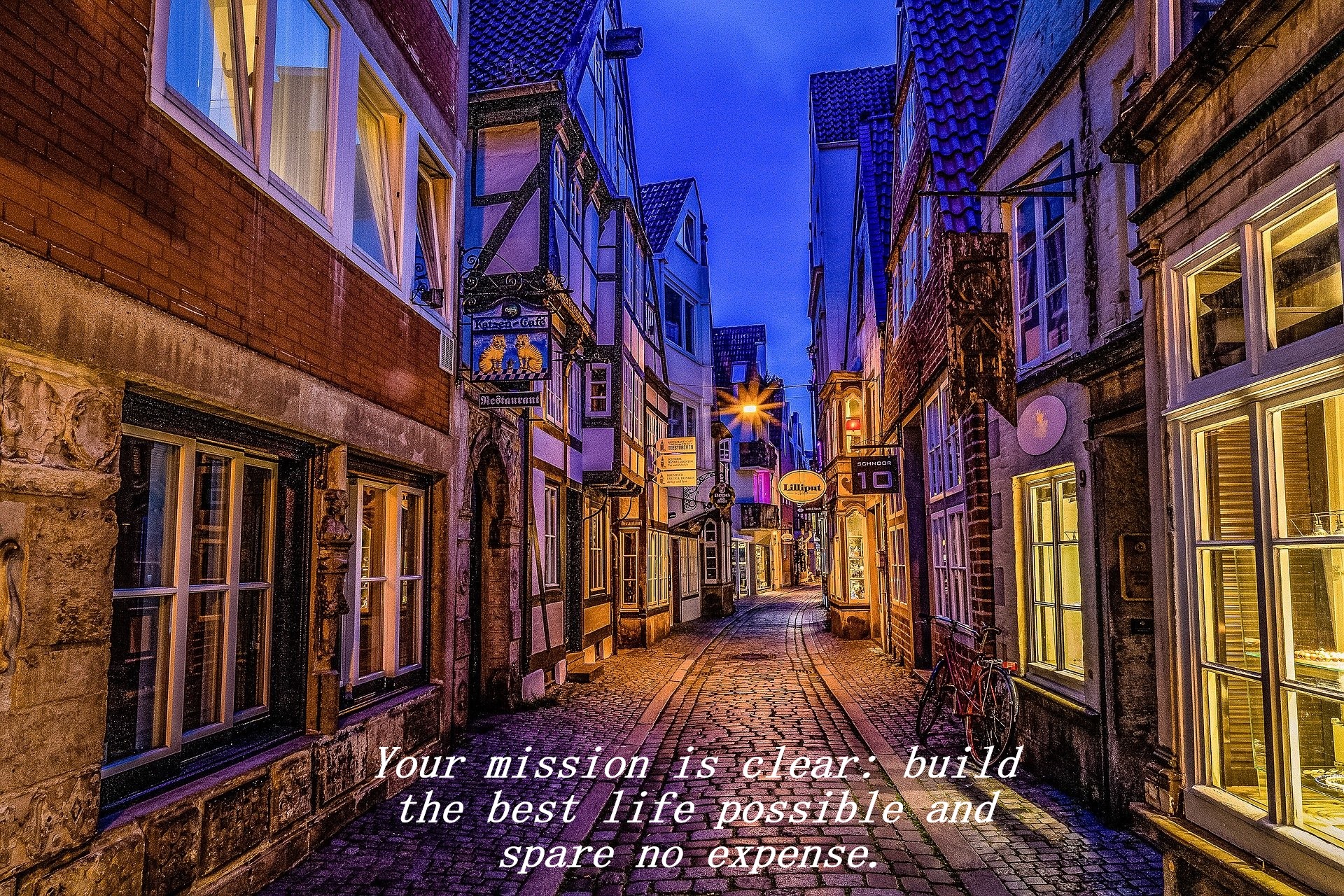Stop repeating what never worked.
Stand back and ask for a new solution.
— Deepak Chopra
CHANGE—why is it so hard? Why do we dread it? Why do we put it off until we can’t bear the pain of not changing? If change were easy, you wouldn’t be reading this book, and I wouldn’t have written it. If it were easy, we would all be doing it willingly and frequently. Complacency is a dream killer. We feel its effects in our lives, which is a good thing. It creates a realization in us that there is a need to change. Change causes us to develop, expand, become more us, grow into our best selves, and become happier. Change causes us to become our own thought leaders, the internal force that inspires and drives us.
So, how do we know whether we need to change and when? By asking ourselves what we desire and why we desire it. Finding our why can be as simple or as difficult as we make it. For a minute, or a few, focus deeply on what you don’t like about that thing you don’t want, that thing you want to change. What is it that makes you sick or disgusted, angry or bored, ashamed or afraid, frustrated or over it? What makes you lose sleep at night?
Here’s where discernment comes in. If your why is that you want to approval, then you want to change yourself for someone else. But someone else’s doesn’t matter, remember? We just learned that in the previous chapters. If you’re to like yourself more, you must reach a point where you Love yourself, with no conditions needed. With that said, wanting change for awakening, actualizing your potential, healing, letting go of what doesn’t serve you, or integrating self-discoveries is the best reason and motivator to change. And with these kinds of changes, all our future experiences in life will shift for the better. Along those lines, if your why is to be healthier or feel more vitality or happiness, there is no better motivation for change.
Most take better care of their cars than they do their mind-body-spirit selves. Although everything in life is temporary, including life itself, you’re here for a stretch, and you want that stretch to feel the best and easiest it can feel. You’re the only you, the only you that will ever exist. You’re one of a kind. Changing for yourself is your right and your responsibility. Make sure that the change you are making is for you and only for you, to be the best YOU for you. An added benefit of that is that when you change for yourself, your change will automatically, naturally, and positively affect those around you.
So, how do we begin the change? The easiest way to begin, especially the change we’ve been putting off or debating, is the same method we used to determine whether we need to change. Ask yourself why you want to make the change. Are your why’s rooted in desires? What are you desiring that you think this change will satisfy? Find out all your why’s, and go to the heart of them, the core desire underneath the why, and write them down on a card, note, or whiteboard or bulletin board. Then, you’re ready to do the next step—make them stick.
How do you make changes stick? Here are a few steps and methods to create change that works.
Envision yourself and your life without that thing you do not want anymore, or with that thing you want. What would your life look like then? How would you feel then? What would you be able to do, be express, have, or experience then? What else would change from that change being completed? Take notes on your vision. Write the details of what your situation will look like after the change and what it feels like. This step really helps you see yourself as if the change already happened and supplies the content for the next step in making the change effective.
Divide the change or goal into mini changes. When people are serious about wanting to change something, they often set the bar too high: I will lose 100 pounds in six months. When they don’t reach their lofty goal, the conditioned response of mental shame and self-critical tapes begin again: I’m a loser; She was right; I shouldn’t have tried this; I’m just no good at this. Don’t set yourself up for disappointment. Be kind to yourself. Divide your big goal or change into smaller, reachable pieces and start simple until you find the pace that feels reachable. It doesn’t matter how long it takes. You’re not in a race. You’re not competing with anyone. This is your life. You design it to feel good and right to you. When something feels good, we stick with it. When we find our rhythm, we know it. You can always adjust your pace as you get more confident in and inspired by your stride and abilities. You will feel good about yourself, and that is the goal, besides aligning with your desired intention.
An intention is a statement or declaration of what you will do, say, think, believe, be, or experience. Thousands of years ago, the sages of India came to observe that we shape our ultimate destinies with our deepest intentions and desires. Everything that happens in the universe begins with a desire, followed by an intention. Whether I’m buying a birthday present, working on a project, or calling a friend, I start with a desire and then set an intention that will satisfy that desire. When you clarity and set an intention, write it down on the same note or card that you wrote the desire that created the intention, and keep that card or note somewhere that you will see every day.
In his article, “5 Steps to Setting Powerful Intentions,” Deepak Chopra, M.D., founder of The Chopra Center for Wellbeing, explained:
“Intention is the starting point of every dream. It is the creative power that fulfills all our needs, whether for money, relationships, spiritual awakening, or Love. An intention is a directed impulse of consciousness that contains the seed form of that which you aim to create. Like real seeds, intentions can’t grow if you hold on to them. Only when you release your intentions into the fertile depths of your consciousness can they grow and flourish. My book, The Seven Spiritual Laws of Success, the Law of Intention and Desire, lays out the five steps for harnessing the power of intention to create anything you desire.
- Slip into the Gap
Most of the time, your mind is caught up in thoughts, emotions, and memories. Beyond this noisy internal dialogue is a state of pure awareness that is the place called the gap. One of the most effective tools we have for entering the gap is meditation. Meditation takes you beyond the ego-mind into the silence and stillness of pure consciousness. This is the ideal state in which to plant your seeds of intention.
- Release Your Intentions and Desires
Once you’re established in a state of restful awareness, release your intentions and desires. The best time to plant your intentions is during the period after meditation, while your awareness remains centered in the quiet field of all possibilities. After you set an intention, let it go — stop thinking about it. Continue this process for a few minutes after your meditation period each day.
- Remain Centered, in a State of Restful Awareness
Intention is much more powerful when it comes from a place of contentment than if it arises from a sense of lack or need. Stay centered and refuse the influence of other people’s doubts or criticisms. Your higher self knows that everything is all right and will be all right, even without knowing the timing or the details of what will happen.
- Detach from the Outcome
Relinquish your rigid attachment to a specific result and live in the wisdom of uncertainty. We base attachment on fear and insecurity, while I base detachment on the unquestioning belief in the power of your true Self. Intend for everything to work out as it should; Then allow opportunities and openings to come your way.
- Let the Universe Handle the Details
Our focused intentions set the infinite organizing power of the universe in motion. Trust that infinite organizing power to orchestrate the complete fulfillment of your desires. Don’t listen to the voice that says you have to be in charge, that obsessive vigilance is the only way to get anything done. The outcome you try so hard to force may not be as good for you as the one that comes naturally. You have released your intentions into the fertile ground of pure potentiality, and they will bloom when the season is right.”
The more you see yourself as what you’d like to become,
and act as if what you want is already there,
the more you’ll activate those dormant forces that will collaborate
to transform your dream into your reality.
— Wayne Dyer
Writing is one of the most powerful and rapid methods to manifest what we want. Don’t type your desires, why’s, visions, and intentions. Write them. There is a different, more integrative energy and sensory process that affects our mind-body-heart connection when we pick up a pen or pencil and write, which does not happen when we type on a computer. When you write each of these desires with intentions, make a few copies. Don’t photocopy—write the copies. The more we write it, the more deeply we plant the energy of our intention and form the new belief that will take us there.
Place these writings in clear sight of you in your daily actions.
The more we see something, the more it reminds us, the more it roots in our awareness, and the deeper it goes into our subconscious. Keep a copy of your intention (s) in your wallet or purse, in a place where it will be visible by you each time you open your wallet or purse. When you feel weak, sad, shamed, fearful, or doubtful, pull it out to remind yourself why you are doing it. Put another copy in a place you will see first thing in the morning, on the bathroom mirror, and last thing at night, next to your bed. Put a copy in the kitchen, in the car, on the TV, on your computer frame, as a screensaver, and anywhere you can see it.
Read them aloud.
As you see each one throughout the day and night, read it out loud. The energy of the voice resonates inside the heart. When the mind hears you speak the intention you desire, the body feels it, and the heart will believe that it is. Don’t worry about what others might think. Just do it. The positive change resulting from your readings will be powerful.
Get an accountability partner.
Being accountable is a great support resource for many people who need help to stay on track to accomplish any goal or change. If you’re being accountable only to yourself, and you don’t enjoy staying on track, who will know if you cheat or give up? Who will encourage you to keep going? Who will remember your why when you have temporarily forgotten or lost your way? Choose an accountability partner who will commit to holding you accountable and reminding you of your why’s, your vision, and how deeply you desire the change. Make sure your accountability partner is someone you respect, someone who respects you, and someone who will always be honest with you.
Track Your Victories.
Note and celebrate your victories, both large and small. Create a journal—a Victory Journal. Write every victory, no matter how small. When you feel as if you’re pushing a heavy boulder up a steep mountain, you will need inspiration. Pull out the journal and read it out loud. When you hear yourself saying it, it registers on a subconscious level, and you will begin believing it. Reward yourself for the large victories. Count the small wins as steps toward the reward for the big one. Buy yourself a new something, treat yourself to a meal out, or celebrate in a way that’s meaningful to you.
Just be careful not to reward yourself with old habits or self-defeating, weakening rewards, like chocolate, gambling, a night out drinking, a shopping spree, or a whole day off from work when you have deadlines and commitments. You must face a whole new bushel of shaming self-talk and end up lower down the ladder.
Know that you can always push reset.
What happens if you fall lower on the ladder and don’t stay on track in your efforts to change? What happens if you give up before you reach your goal? What happens if you make a mistake or you cheat? Remember from Chapter 3 that everything happens for a reason. Failures are lessons that teach us what did not work or something about ourselves or our desire that will help us get clearer and more certain. Failures never identify who we are.
Realizing that life offers learning with each slip, miss, or shift gives us an opportunity to experience and awaken to something new. Remember imagining when you first learned to walk and saying, after your first fall, “Well, that was a major mistake. I failed. I guess I’m not meant to walk.” Failure is not the end. It’s an opportunity to see what worked and what didn’t, try something new, and strengthen your walking muscles. It’s a new starting point, a chance to re-calibrate and reset your feet.
You are in a constant state of change, even if you can’t feel it. Your job is to create the changes you want ahead of time, by knowing what you want and why you want it and setting the wheels in motion with your intention. You create your destiny. You have the power to do so because; You are Great!
You are what your deepest desire is. As your desire is, so is your intention.
As your intention is, so is your will. As your will is, so is your deed.
As your deed is, so is your destiny.
— The Upanishads, Vedic text



